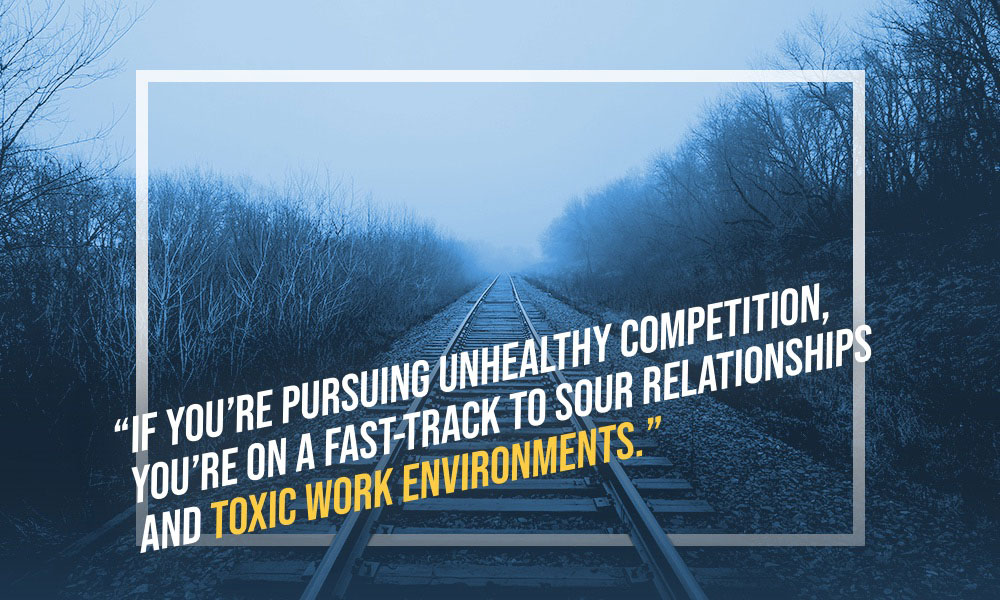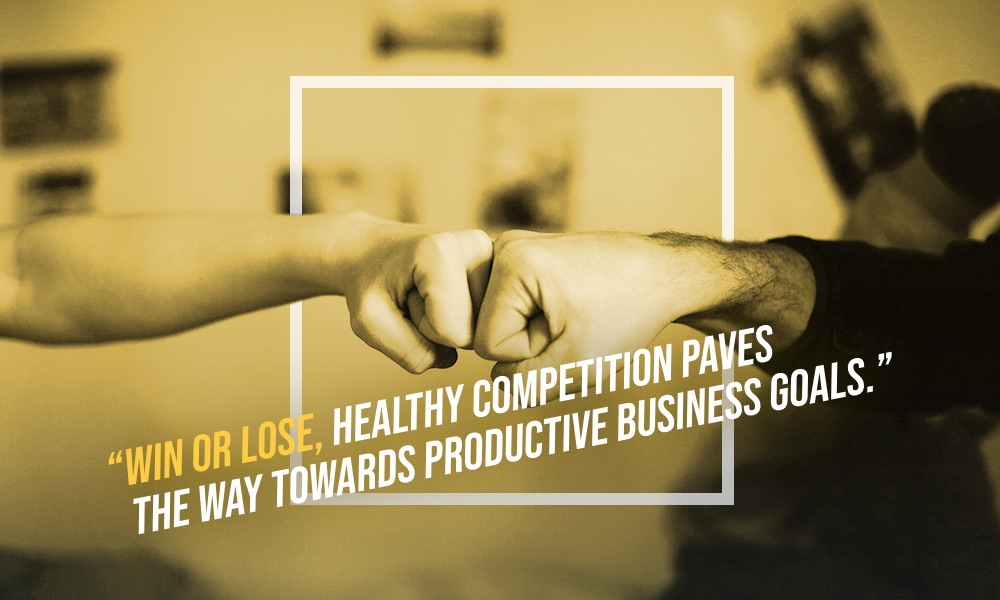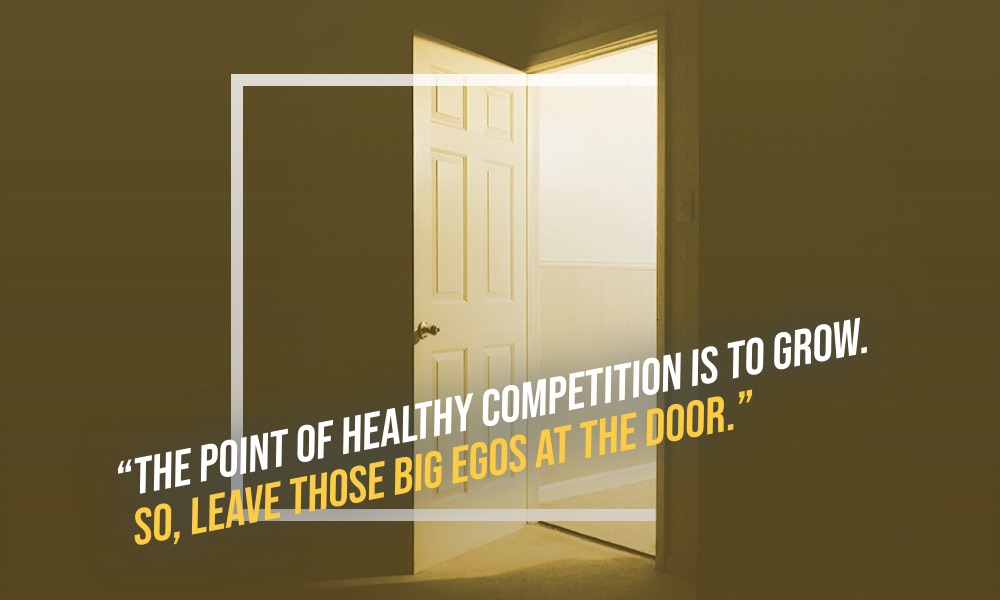We’re all familiar with the phrase, “A little competition never hurt anybody.” But is that really true, or can too much of a competitive spirit be a bad thing? The answer boils down to the type of competition you involve yourself in.
There are 2 types of competition: healthy competition and unhealthy competition. In business, the first type of competition will drive you to achieve your goals. The second type may force you to think negatively of yourself or others.
If you’re looking to achieve a gold medal in business success, it’s time to learn how to participate in healthy competition.
What’s the Difference Between Healthy and Unhealthy Competition?
You don’t have to be athletic to know that human beings are motivated by competition. There’s a touch of competition in just about everything we do. We race to get to the best parking spot or shortest checkout line at the grocery store. We negotiate for the lowest price on a new house or car. We even duke it out to be first on the school pickup line!
In business especially, competition is an incentive to reach our goals. It can satisfy our natural desire to win and conquer life’s challenges. Competition can also serve as a motivator to improve our performance, learn new skills or better our efficiency.
However, there is a very fine line between healthy and unhealthy competition. Let’s take a deeper look at their differences.
Healthy Competition in Career and Professional Goals
Healthy competition inspires you to become a better person. This form of competition helps you continuously grow and challenges you to find creative, out-of-the-box solutions to your problems. It motivates you to better your skills, and it encourages you to set daily goals that bring you closer to your dreams.
This type of competition is considered healthy because it promotes a positive mindset. In healthy competition, you don’t second-guess your abilities or compare your success to others. The only person you compare yourself to is the ‘old you,’ because you work to better your own skills every day. Your biggest competition is yourself.
Healthy competition can ultimately improve your self-esteem and mental health. When you set daily goals that challenge you to become a better person, you’re pursuing a healthy form of competition.
Unhealthy Competition in Career and Professional Goals
On the other hand, there’s unhealthy competition. Unhealthy competition bullies you into becoming a not-so-kind person—both in the way you treat others and yourself. This form of competition is driven by a need for attention and validation from outside sources. Without this validation, you feel inadequate or under-qualified.
This type of competition is considered unhealthy because it breeds a negative mindset. It begins when you compare yourself to others, always looking out for recognition from peers or colleagues. Unhealthy competition can even cause you to sabotage others to advance your own personal success. With this mindset, everyone is your greatest competition… even those who aren’t running in the same race.
Unhealthy competition will ultimately impact your self-worth, which can influence your ability to perform and reach your goals. You end up comparing your work to others’ instead of focusing on your own abilities and progress. If you’re pursuing unhealthy competition, you’re on a fast-track to sour relationships and toxic work environments.

Is Competition Healthy in Business?
Competition is definitely healthy in business! It serves as a fantastic motivator to work on your skills, better your personal development and improve your problem-solving abilities. However, when taken to the extreme, unhealthy competition often leads to a “scarcity mindset.” A scarcity mindset is when you believe there is limited success to go around.
Where does a scarcity mindset come from in business? Typically, it stems from feelings of fear and inadequacy. Your mind tricks you into believing that the success of your peers threatens your ability to become successful. Or because others are excelling before you, you feel you’ll never be able to catch up.
But that’s just nonsense. There is plenty of success to go around—and the good fortune of others doesn’t limit your individual progress!
In business, it pays to avoid people with a scarcity mindset. Like Dean Graziosi says, “The people in our lives who are negative, competitive or jealous can really drain our energy and our confidence. There are battery chargers and battery drainers. I only like to be around battery chargers because they’re more positive and help drive me, not drain me.”
Keeping battery drainers in your professional network will only negatively impact your mental health. Instead, surround yourself with positive people—in real life and on social media—to form a positive network that helps you grow and improve your business confidence.
How Healthy Competition Can Drive Business Success
Unlike unhealthy competition, healthy competition can bring out the best in people, especially in a professional setting. It helps individuals grow, encouraging them to improve their skills and expand their mindset. It’s also an untapped source of creativity. When presented with a challenge, entrepreneurs, business owners and employees try new (and sometimes unconventional) methods to solve difficult problems.
Not to mention, healthy competition can serve as a life lesson on how to accept defeat from time to time. Good sportsmanship is key in business, and healthy competition can strengthen a positive attitude. Win or lose, healthy competition paves the way towards productive business goals.

Healthy Competition as a Motivator to Achieve Business Goals
Healthy competition is a fantastic motivator to achieve your long-term professional goals. This is especially true if you’re always competing against yourself. With healthy competition, you search out ways to become better than you were last week or last year. This way, you’re always honing your skills and looking for opportunities to advance your career goals.
If you operate a business, healthy competition can also drive overall business goals. A healthy dose of competition motivates employees to tackle problems from different angles, and it inspires them to put in more effort at work. The result? A team inspired to achieve greater results, leading to a stronger business overall.
3 Ways to Encourage Healthy Competition in Business
As we mentioned earlier, there’s a very fine line between healthy competition and unhealthy competition. To encourage healthy competition in business—and avoid teammates turning into “battery drainers”—it’s essential you lay down some ground rules. A basic set of guidelines ensures everyone is on the same page and limits the chances of someone feeling discouraged.
If you’re looking for inspiration on how to set up a healthy competition, consider Dean’s latest fishing trip with 10 of his ultra-competitive friends. When the day evolved into a friendly competition over who could catch the most fish, Dean took home the prize. Let’s examine how to encourage healthy competition, and we’ll see how that competition stayed friendly.
1. Set Parameters for the Competition
To keep things on a level playing field, set parameters for the competition. These parameters could be cut-off hours for how long each individual has to work on the task at hand or a limit on the number of outside resources they can use. The goal isn’t to discourage people from working hard or taking pride in their own work. Rather, the goal is to put safeguards in place to ensure the competition remains healthy and fair.
In Dean’s latest friendly competition, the challenge was to catch the most fish. The parameters for the competition included a 20-minute time limit at each of the 8 fishing holes, shared fishing equipment and shared bait to attract the fish. This way, no single person had an unfair advantage.
2. Encourage Teamwork Among Competitors
Once your parameters are in place, it’s time to encourage teamwork among competitors. Yes, that’s right—teamwork! No solo shine here, folks.
Like human behavior author Alfie Kohn once said, “People will typically be more enthusiastic where they feel a sense of belonging and see themselves as part of a community than they will in a workplace in which each person is left to his own devices.”
Make each person feel like they belong by assigning teams or pairs for your healthy competition. This will inspire individuals to bring their A-game to their team instead of feeling like it’s their own abilities vs. the world.
For example, in Dean’s fishing competition, competitors were split into teams of 2. Each team member took a turn at each fishing hole. Throughout the competition, teammates shared the insights they’d gained at each hole to help their partner catch more fish.
3. Promote Positivity and Humility
If you want a healthy competition to remain healthy, you must encourage positivity and humility among all participants. There should be no sore losers or, even worse, obnoxious winners. It’s important that everyone tries their best, enjoys themselves and grows—not that they win. And whenever someone does eventually win, do not allow gloating.
Take it from Dean: When he and his partner won their recent fishing competition, they didn’t gloat or rub it in their friends’ faces. Instead, they shared tips with their friends so they all could improve together. While there’s nothing wrong with friendly bragging rights, the point of healthy competition is to grow. So, leave those big egos at the door.

How to Know When Friendly Competition Goes Too Far
A competitive environment can boost motivation and innovation in business. However, that fine line between healthy and unhealthy competition can quickly blur. Before long, what started off as a friendly competition can turn ugly. Take a look at these warning signs to know when a competition has gone too far.
When Competitors Start Trash-Talking Each Other
Even outside of athletics, competition breeds “locker room chatter”—where individuals hype up their abilities and trash talk the competition. But let’s be clear: There’s a difference between saying, “You can’t touch this” and, “You suck at this, loser.” One is friendly and means no harm. The other is rude and could impact the person’s self-worth.
The entire point of healthy competition is to not pit competitors against one another in a harmful way. Participants should never resort to name-calling or other behaviors of a 10-year-old. When friendly chatter turns cut-throat, it’s time to cut the competition short.
When Competitors Have Something Major to Lose
Healthy competition can light a fire under people, encouraging them to push their creative limits. However, when people stand to lose something major, it will breed fear and anxiety—not innovation and productivity. Instead of boosting self-esteem, this toxic sense of competitiveness will cause competitors to question their self-worth.
Healthy competition is based on positive incentives, such as bonuses or prizes. Unhealthy competition is based on negative threats, like missing out on a promotion or being put down for failing. Encourage healthy competition by providing incentives, not threats.
When Competition is Never-Ending
Healthy competition is fun every once and a while, but you shouldn’t compete all day, every day. Never-ending competition will ultimately have negative impacts on all involved. When competition becomes the gold standard, individuals won’t feel motivated to succeed on their own terms. Instead, they will just be motivated to get a leg up on their peers. This can breed feelings of jealousy, so don’t make competition the end-all, be-all of business.
Encourage Healthy Competition in Your Career
It’s crucial to recognize the differences between unhealthy and healthy competition in business. When used to motivate yourself and encourage others, competition can help you conquer your goals. But when used to compare levels of success, competition can damage your mental health.
Use healthy competition to drive your goals and empower your peers to achieve theirs. And ditch the unhealthy competition before it’s too late.

How will you use healthy competition in business?
Text Dean “We win together” to 480-400-9019.
Your text will go straight to Dean’s personal cell (yes, really!).






One Response